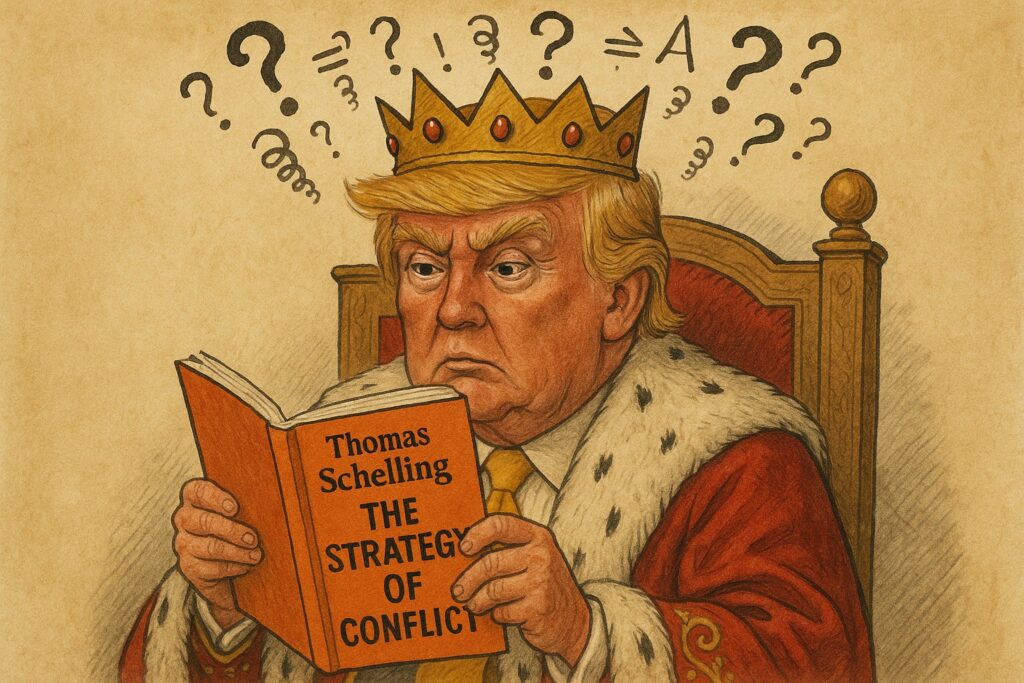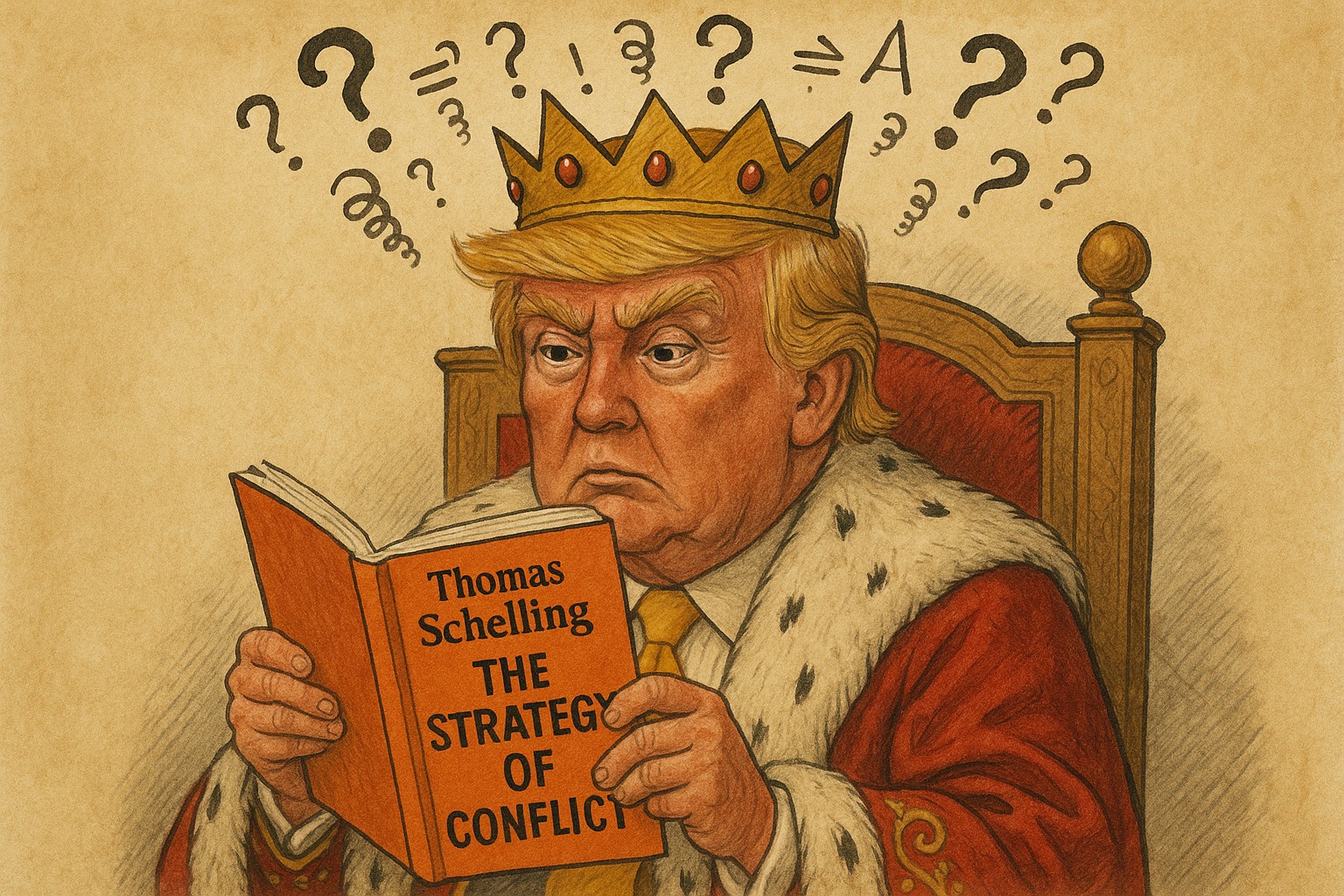It is certain that President Trump’s reply to the TACO (“Trump Always Chickens Out”) accusation will not win him a Nobel prize in economics. The Wall Street Journal reports (“The ‘TACO Trade’ That Has Trump Fuming,” May 28, 2025):
The president rejected claims that he is backing down on tariffs, saying his strategy involves setting a “ridiculous high number” before negotiating it down in exchange for concessions. “You call that chickening out,” Trump said in the Oval Office, adding that “it’s called negotiation.”
It’s called negotiation only when the threat is credible and the author of the threat can, through his reputation or other means, commit himself to follow up on it.
To focus on the theory of negotiation proposed by Mr. Trump, we will assume that international trade negotiations are successful if they reach the goal officially pursued by the ruler-negotiator—in this case, maximizing exports and minimizing imports. In other words, we neglect the fact that the cost of protectionist policies is mostly paid by the subjects of a protectionist ruler.
The Chicken game, an instance of game theory, provides a useful approach. Consider the table below. The chicken metaphor refers to two players, C (Charlie) and D (Donald), who are driving towards each other on the white line of a road to see who will chicken out first and swerve to avoid the collision. The first payoff matrix at the top of the table gives an index of each player’s ordinal utility. The first number in each cell gives C’s utility, and the second number D’s utility. (These payoffs represent each player’s ordinal preference rankings, not cardinal gains.) If none swerves, the two will collide and produce the worst outcome for each player: 0,0. If they both chicken out, they both survive; the payoffs are 2,2 (meaning better than 0 for both). If only one, say D, swerves, he also gets 2, but since he has chickened out, C wins and gets 3, his best result; the payoffs are 3,2. Mutatis mutandis if C swerves. The interpretation for a trade war between two autocratic rulers is obvious: the one who swerves, who chickens out, loses out compared to his most favorable outcome (which he ranks 3).
The bottom part of the table provides a more general characterization of the Chicken game’s structure. In a Chicken game (instead of some other game), T>R>S. The game described in the top part of the table satisfies the condition because 3>2>0.
Another metaphor can be used for the Chicken game: the Hawk-Dove game, which has exactly the same structure, that is, T>R>S. Each of the players can play hawk or dove, in the sense of attack or submission. A player gains the most if he plays hawk (T) and the other submits (R). But if the other also plays hawk, they both face the worst outcome because the fight can result in each being injured or killed (S, S). If they both play dove (R, R), each realizes that he might be better off switching to hawk if the game continues in other rounds. In a one-shot game, the two so-called “Nash equilibria”—situations where no player has an incentive to deviate unilaterally—consist in one playing dove and the other hawk. The Hawk-Dove interpretation of the game can serve to analyze conflicts and bullying. If one player, the bully, succeeds in persuading the other that he will play hawk, the latter’s interest is to submit and play dove. (The first comprehensive discussion of such games in war or negotiation was economist Thomas Schelling’s seminal 1960 book, The Strategy of Conflict.)
In this sort of game (conflictual games with strategic interaction), a threat can only be successful if its author can persuade his adversary that he is committed to following up on his threat—that he is not bluffing. If player D (for example) announces that he wants to play hawk (with “a ridiculous high number”) but that he will retreat as a dove if the other calls his bluff, he is inviting the latter to do exactly that and play hawk. Declaring in advance that one’s threat is a bluff is not a strategy to win but a plan to lose. If I declare that I will play hawk and that you better play dove and, in the same breath, let you know that my threat is not serious, I am inviting you to play hawk. If I tell you that I am ready to chicken out, you are not the one who will.
Mr. Trump has told the whole world and shown that, in trade negotiations, he will back down from his threats if his adversary resists. Indeed, many on Wall Street believe that financial markets have not tanked more because “Trump Always Chickens Out.”
It is virtually certain that, in the EU or even Chinese governments, some advisers to Ms. von der Leyen or Mr. Xi know how to think of negotiations in terms of game theory and are not scared to tell their rulers what the latter may not wish to hear. Why are there no such advisers in Mr. Trump’s entourage?

******************************

The king studies strategy, by ChatGPT


READER COMMENTS
Warren Platts
Jun 3 2025 at 12:08pm
Interesting. No coincidence then that President Claudia Sheinbaum of Mexico has officially renamed the iconic “Liberty Bell” to the “TACO Bell” for all Mexican atlases, encyclopedias, and history textbooks…
https://drudge.com/news/284303/mexico-renames-liberty-bell-taco-bell
Craig
Jun 3 2025 at 3:38pm
Well, she can do that but then she’s buying Taco’s on Tuesdays.
Jon Murphy
Jun 3 2025 at 9:03pm
You are fully aware that comes from a satire site, right?
steve
Jun 3 2025 at 3:30pm
I understand the idea that in negotiations that you can ask for more than you want and then settle for less, going back to your actual goal. I have never understood the Trump fans who claim that announcing you are setting demands way too high and that you intend to drop back is a good negotiating tactic.
What is maybe worse is that Trump will then announce he has negotiated the best deal ever (every deal he makes is the best ever) when much/most of the time the deal really sent done and/or its obviously not such a great deal, and then his fans laud him.
Steve
Craig
Jun 3 2025 at 3:40pm
I think he’s figured out his words can cause movements/gyrations in markets and I think he might be doing that on purpose.
Pierre Lemieux
Jun 3 2025 at 4:30pm
Craig: I have thought about that too, but I am not quite sure how to model it. Perhaps it’s like a pyromaniac who loves the impression of moving things in the world (it gives him utility): he starts a fire and thereby brings lots of firetrucks and police investigators. That could be a substitute for the feeling of impotence the most humble people feel in the universe (and in their village).
Craig
Jun 3 2025 at 4:48pm
Blue Horseshoe likes Anacott Steel. Particularly when Blue Horseshoe knows he’s about to announce steel tariffs benefitting Anacott Steel.
Pierre Lemieux
Jun 3 2025 at 8:17pm
Craig: OK, I see what you mean. That may be another reason, less psychologically tortured.
David Seltzer
Jun 3 2025 at 4:56pm
Pierre: Informative post. I suspect many of your students benefitted greatly from your teaching. You asked, “Why are there no such advisers in Mr. Trump’s entourage?” I suspect Mr. Bessent convinced Mr. Trump of his folly. In the lower right Hawk-Hawk quadrant, Chairman Xi responded to DJT’s egregious tariff threats by dumping treasuries, assuring mutual economic wreckage. The ten year treasury touched 5%. Japan’s Finance Minister Kato followed suit. At the margin, 5% debt service on US debt severely hampers bond rolls. Did DJT chicken out or become the dove? I think his advisors convinced him the better trade-off was rolling back the bellicose threats.
Daniel Hill
Jun 3 2025 at 7:06pm
Not only have foreign governments figure out TACO, they’ve also figured out TIFS – Trump is for sale.
Matthias
Jun 4 2025 at 7:08am
We would all be better off, if Trump were properly for sale.
In that case, you could just give him a global index ETF (like VWRA), and watch him make good policy.
Pierre Lemieux
Jun 4 2025 at 10:31pm
Interesting remark, Matthias. It touches deep issues of political economy. The formula would only work (“work” in the several interests of the subjects) if everything everybody wanted in life were perfectly correlated with the financial return of the indexed portfolio. A bit similarly, communism (or some other form of collectivism) would work only if everything everybody wanted in life were perfectly aligned on the resource and income allocations decided by the regime.
It is true that your proposal would satisfy more people than a government’s arbitrary decisions, continuous lies, haphazard exactions, clowneries, trade wars (if not real wars), and chaos. But wouldn’t the Chief Executive, for example, force some of his friends (non-Maga people) to stop working for small businesses and work (at lower wages) for indexed corporations? You can imagine other similar interventions that would improve the Chief Executive’s indexed portfolio.
Another way to look at this is Mancur Olson’s. The king does take good care of his kingdom because everything in there belongs to him. Mancur Olson’s thesis was—if I may make it a bit more radical than he did–that things are even better taken care off if they are severally owned by the individual subjects.
David Seltzer
Jun 5 2025 at 11:22am
Pierre: Interesting response to Mattias. “The formula would only work (“work” in the several interests of the subjects) if everything everybody wanted in life were perfectly correlated with the financial return of the indexed portfolio. ” The S&P ESG index is correlated with the S&P 500 index at about .95. It has outperformed the S&P index, adjusted for risk, by about 400 bps. The S&P 500 ESG index is skewed towards firms with higher environmental, social, and governance (ESG) scores and had a higher concentration of technology securities than the S&P 500 index. If the former Biden administration were given a global index, would investors be forced to buy the ESG index? Would Mr. Biden be for sale to George Soros? As an investor, I want the highest risk adjusted return on my investment. I would choose the ESG index without being coerced. Others would veto the ESG index for reasons of their own; hence correlation coefficient is not perfect.
Comments are closed.